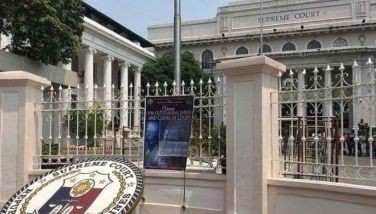SC allows plea bargain in drug cases
MANILA, Philippines — The Supreme Court (SC) yesterday allowed with finality plea bargain deals in drug cases.
The high court affirmed its ruling last August that declared as unconstitutional the prohibition against plea bargaining in Republic Act 9165 (Comprehensive Dangerous Drugs Act of 2002).
The SC dismissed with finality for lack of merit the motion for reconsideration filed by prosecutors in the case involving Salvador Estipona versus Legaspi City Regional Trial Court (RTC) Branch 3 Judge Frank Lobrigo.
With the final ruling, accused in drug-related offenses can now plead guilty to a lesser offense, provided that it is allowed by the prosecutor.
The Court stood firm in its earlier finding that Section 23 of RA 9165 was contrary to Article 8, Section 5 (5) of the 1987 Constitution giving the SC the authority to allow plea bargaining.
Such provision states that any person charged under any provision of law – regardless of the imposable penalty – shall be denied plea bargaining or pleading guilty to a lesser offense with the consent of the prosecutor.
This section guarantees “protection and enforcement of constitutional rights, pleading, practice and procedure in all courts, the admission to the practice of law, the integrated bar and legal assistance to the underprivileged.”
Estipona was reportedly caught in possession of .084 grams of methamphetamine hydrochloride or shabu. He was charged with violation of Article 2, Section 11 of RA 9165.
Estipona, represented by the Public Attorney’s Office (PAO), questioned Lobrigo’s decision to deny his motion for plea bargain agreement before the SC.
Last year, PAO chief Persida Rueda-Acosta said over 82,000 small time drug offenders were rotting in prisons.
Meanwhile, the SC ordered the Philippine National Police (PNP) to answer two new petitions against the Duterte administration’s war on drugs.
In full-court session, the high court decided to require PNP chief Director General Ronald dela Rosa and other respondents from the police force and the Philippine Drug Enforcement Agency (PDEA) to comment on similar petitions filed last month by human rights groups Free Legal Assistance Group (FLAG) and Center for International Law (CenterLaw). The Court gave them a non-extendible period of 10 days to comply with the order.
The SC has also consolidated the two petitions and set oral arguments for Nov. 21.
In its petition, FLAG asked the high court to issue a temporary restraining order stopping the implementation of PNP Command Memorandum Circular No. 16-2016 or “Oplan Double Barrel.”
No official memos
The group urged the SC to stop the PNP from further carrying out earlier instructions and pronouncements of President Duterte on the drug war not contained in an official executive order.
They alleged that the war on drugs “violates the right to life, to due process of law, to be presumed innocent and to a fair trial by expressly authorizing the summary killing of suspected drug offenders in the guise of ‘neutralizing’ or ‘negating’ them.”
The group also accused law enforcers of “doing away with the basic police duty of evidence-gathering and case build-up.”
They stressed that house-to-house visits being conducted by PNP are unconstitutional because “they are not limited to drug suspects and based on furtive fingers of unknown informants.”
FLAG also assailed the Department of the Interior and Local Government Memorandum Circular 2017-112, or the “Masa Masid” project, which allows citizens to report suspected drug offenders by writing their names on pieces of paper and placing them in designated drop boxes.
They claimed the tact was no different from the oppressive practices by the Japanese and the Nazis in their occupied lands during World War II.
FLAG filed the petition for two victims of extrajudicial killings identified as Ryan Dave Almora and Rex Appari and a survivor identified as Jefferson Soriano of police anti-narcotics operations.
In the same petition, FLAG sought issuance of a writ of amparo and temporary protection order prohibiting police authorities from getting near the residence or workplaces of the families of petitioners.
Almora and Aparri were shot dead during a house search while Soriano survived an alleged summary execution attempt.
CenterLaw, on the other hand, filed its writ of amparo petition for the families of 35 alleged drug suspects killed in anti-narcotics operations of police over the past year and for some residents of San Andres Bukid district in Manila.
The group sought issuance of a temporary protection order prohibiting police authorities from getting near the residences and workplaces of the families of the 35 slain drug suspects.
It also sought to prohibit the respondents from harassing, contacting or communicating with the affected parties, directly or indirectly.
For residents of 26 barangays in San Andres Bukid, petitioners asked the SC to prohibit police from coercing barangay officials into submitting lists of suspected drug offenders.
They urged the high tribunal to first compel authorities to comply with the constitutional requirements of due process, the requirements of the Data Privacy Act and regulatory assurance against arbitrariness and criminal machination.
The petition cited the systematic violence allegedly committed by members of the Manila Police District Station 6 in the urban poor community of San Andres Bukid and adjacent areas.
The petitioners also asked the SC to enjoin the respondents from conducting any anti-illegal drugs operations in San Andres Bukid without the required coordination and presence of representatives from the barangay, the PDEA and media.
Similar petitions against the war on drugs have been filed before the high court.
A writ of amparo petition was filed earlier this year for a survivor and families of four men allegedly killed by members of the Quezon City Police District in Payatas during an Oplan Tokhang operation last year.
Last September, a petition was also filed asking the SC to order government agencies to resolve cases of extrajudicial killings under the war on illegal drugs.
The group led by lawyer Evalyn Ursua urged the high court to issue a writ of mandamus directing specific government agencies to perform their constitutional duties to prevent violations of the right to life and to investigate and resolve drug-related killings.
- Latest
- Trending




























